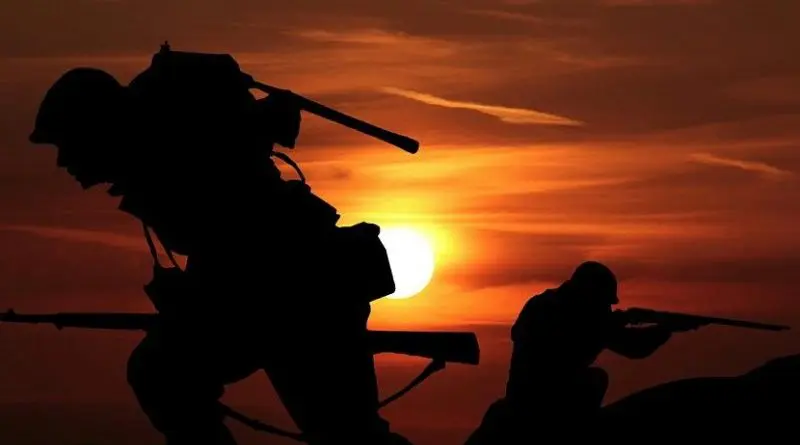The Crude Instinct Of Solving Problems By Warfare – OpEd
By IDN
By Jonathan Power*
“We showed weakness and weak people are beaten,” said President Vladimir Putin in September 2004, surveying the wreckage of the battle-scarred school in Beslan in Russia after Chechnyan terrorists had tried to hold children hostage and the army was sent in. Hundreds of children died, probably unnecessarily.
We knew then what President George W. Bush meant when he said after his first meeting with Putin that he had looked into his eyes and had seen his soul. He had indeed found a soul mate. The meek, they both believe, shall not inherit the earth. Putin these days is a soul on ice—only divine intervention can now save the Ukrainians from doom.
“Who fights with Dragons”, said Nietzsche, “shall himself become a dragon”. But the other horn of the dilemma is he who does not fight with dragons may be devoured by them.
War is sometimes perhaps necessary. But in too many cases, it degrades the fighter and his cause. The resort to force is too often crudely instinctive, as in Iraq with the US/UK invasion in 2014, despite the thinness of the arguments for war.
In the Russian case, the lack of sophistication of the troops, first in Chechnya and then in Beslan, horribly, with their mad, undisciplined, over-armed rush to free the children, allowed animal instincts to overcome all rational behaviour.
As for Ukraine, there are war crimes committed every week, mainly by Russia but also by Ukraine, and the end is nowhere in sight.
Yet for all that war in the world is diminishing.
Undoubtedly, the European Union’s greatest achievement has been to cement the warring nations of Europe into a peaceful whole. For the first time in history a not insignificant number of states have been free from war for the best part of two centuries.
In Europe there are Sweden and Switzerland, both despite a long tradition of warfare. In Latin America, Venezuela, Costa Rica and Brazil have now lived out over a century without war. Indeed, entire regions of our planet have escaped internal war for well over a century- North America most importantly.
Neither Canada, Mexico nor the U.S. maintains troops on each other’s borders. Likewise, the South Pacific has long been peaceful, apart from a brief invasion by the Japanese in the Second World War and by relatively small-scale conflicts in West Iranian and East Timor.
Looking back over a vast historical panorama, Oxford historian Evan Luard, in his meticulous book on the history of war, showed that overtime wars have become less frequent and the number of years in which an average country has been involved in war has declined over the centuries. He also showed that we see from our modern perspective that the reasons wars were fought were not issues that would now engage most of us.
Would we fight to keep our prince in power? Would we fight for our tribe (unless we were Basques, Serbs or Ulstermen)? Most of us certainly wouldn’t fight for our religion and it is extremely doubtful if we would fight to expand the territory of our country.
Putin seems to have taken a leap backward into a history that has now moved on for most nations and leaders. The biography of Mikhail Gorbachev by another Oxford don, Archie Brown, reveals not one mention of Chechnya, and that Gorbachev when faced with insurrection in the Baltic States withstood the formidable pressure from the Soviet military to wield the big stick.
It was Boris Yeltsin who made the decision to unravel everything that Moscow had learnt from its war in Afghanistan and unleashed the dogs of war in Chechnya. But to its credit the Yeltsin administration arrived at peaceful power sharing agreements with restless Tatarstan, Bashkiria and forty other regions and allowed Ukraine to become its own country.
This latter fact reflected a trend that was worldwide. Between 1993 and 2001 the number of wars of self-determination was halved. During the 1990s sixteen separatist wars were settled by peace agreements and ten others were checked by ceasefires and negotiation, according to the Minority at Risk Project of the University of Maryland.
War, the systematic and organized use of violence with all its bestial destructiveness, is peculiar to the most advanced of animals, man. Writing in the sixteenth century the Dutch philosopher Erasmus asked, “Whoever heard of 100,000 animals rushing together, to butcher each other, as men do everywhere?”
Not for nothing is the Vietnam memorial in Washington so different from its flamboyant, patriotic forebears. Instead of eagles and rifles there are only stark slabs of black marble with the names of the American dead engraved on them. As Michael Mandelbaum has observed, “it represents the soldier not as hero but as an innocent and faceless victim.”
Putin and Bush, the soulmates, are throwbacks to a bygone age. As long as Putin remains in power the peoples of the world are stymied from making further progress to discard war—an ambition that only a few years ago a majority seemed set on.
* Jonathan Power was for 17 years a foreign affairs columnist and commentator for the International Herald Tribune, now the New York Times. He has also written dozens of columns for the New York Times, the Washington Post, the Boston Globe and the Los Angeles Times. He is the European who has appeared most on the opinion pages of these papers.


Where do you get the moral right to qualify a people as primitives who fight for their tribe. With this move, you prove not only your ignorance, but also your character, especially your morals. Nikola Tesla was a Serb, a very religious man, a respecter of Serbian tradition. Do you also count him among the Serbian primitives?